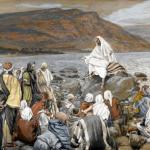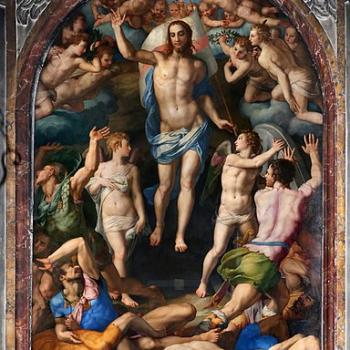Unforgivable Sin (Blaspheming the Holy Spirit) / Plots to Kill Jesus / Rude Jesus? (“Who is My Mother?”)

This is an installment of my replies to a series of articles on Mark by Dr. David Madison: an atheist who was a Methodist minister for nine years: with a Ph.D. in Biblical Studies from Boston University. His summary article is called, “Not-Your-Pastor’s Tour of Mark’s Gospel: The falsification of Christianity made easy” (Debunking Christianity, 7-17-19). His words will be in blue below.
Dr. Madison has utterly ignored my twelve refutations of his “dirty dozen” podcasts against Jesus, and I fully expect that stony silence to continue. If he wants to be repeatedly critiqued and make no response, that’s his choice (which would challenge Bob Seidensticker as the most intellectually cowardly atheist I know). I will continue on, whatever he decides to do (no skin off my back).
Dr. Madison believes we are not at all sure whether Jesus in fact said anything recorded in the Gospels. The atheist always has a convenient “out” (when refuted in argument about some biblical text) that Jesus never said it anyway and that the text in question was simply made up and added later by unscrupulous and “cultish” Christian propagandists.
I always refuse to play this silly and ultimately intellectually dishonest game, because there is no way to “win” with such a stacked, subjective deck. I start with the assumption (based on many historical evidences) that the manuscripts we have are quite sufficient for us to know what is in the Bible (believe it or not).
Dr. Madison himself — in his anti-Jesus project noted above, granted my outlook, strictly in terms of practical “x vs. y” debate purposes: “For the sake of argument, I’m willing to say, okay, Jesus was real and, yes, we have gospels that tell the story.” And in the combox: “So, we can go along with their insistence that he did exist. We’ll play on their field, i.e., the gospels.” Excellent! Otherwise, there would be no possible discussion at all.
*****
Dr. Madison called this installment: “How Come Jesus Didn’t Know Better?: Jesus and the demons” (4-20-18).
[I pass over Dr. Madison’s rant against angels, demons, Satan, and benevolent dead saints. He gives no arguments and merely assumes that such beings are self-evidently false and superstitious (“Mark chapter 3 is a major embarrassment to devout Christians who have learned to think like citizens of the 21st Century,” etc. ad nauseam); hence, nothing in this section to refute or interact with. I deal with arguments, not bald self-assumed infallible and invulnerable ravings]
Perhaps the most regrettable part of this pronouncement comes at the end: You’re not allowed to insult one of the big shots in the spirit world:
• “Truly, I say to you, all sins will be forgiven the sons of men, and whatever blasphemies they utter; but whoever blasphemes against the Holy Spirit never has forgiveness, but is guilty of an eternal sin”—for they had said, ‘He has an unclean spirit.’” (vv. 28-30)
We have to assume that the Christians who ‘love their Jesus’ don’t pay much attention to this text—or are as heavily into magical thinking as the guy who wrote it. Everything else can be forgiven, but not blaspheming the holy spirit? Of course this makes no sense whatever from the standpoint of rational ethics.
It’s because this blasphemy is rejection of God Himself (Whom the Holy Spirit and Jesus are). It’s calling evil good. Hence, it can’t and won’t be forgiven in the sense that there is no repentance and the person has completely and utterly rejected God (completely hardened their hearts, as the Bible often expresses it). Jesus said this after the hostile “scribes” charged that He was “possessed by Be-el’zebul, and by the prince of demons he casts out the demons” (3:22, RSV; cf. Jn 10:20). They were saying He was either a demoniac or an idol- or devil-worshiper. And so Jesus replied (quite sensibly and logically):
Mark 3:23-26 . . . “How can Satan cast out Satan? [24] If a kingdom is divided against itself, that kingdom cannot stand. [25] And if a house is divided against itself, that house will not be able to stand. [26] And if Satan has risen up against himself and is divided, he cannot stand, but is coming to an end.”
He completely nailed them for something that made no sense whatsoever: the devil literally fighting against himself by allowing one of his supposed agents / demons to cast out other of his demons. Huh? Then He made the point that lying about God in this way was so evil that it would lead to damnation (the absence of any more forgiveness and the presence of “eternal sin” in hell). Jesus adds in the parallel account in Matthew:
Matthew 12:28 But if it is by the Spirit of God that I cast out demons, then the kingdom of God has come upon you. (cf. Lk 11:20: “. . . by the finger of God . . .”)
How in the world this is “regrettable” and how it supposedly “makes no sense whatever from the standpoint of rational ethics” is, I’m afraid, beyond me. It would be like calling a doctor who just did a successful eight-hour heart surgery on a patient (saving her life) an “evil man who serves Satan”: as if what he did was a bad thing, only deserving of scorn and derision. That’s a very wicked lie; and it would richly deserve precisely the rebuke that Jesus gave an even more outrageous and vicious lie.
In effect, Jesus was expressing the thought that, “if you call even the benevolent God evil or in league with Satan and demons, then there is no hope for you, as you have rejected the sole source of your possible salvation.” And that is merciful and perfectly rational and ethical. He’s telling them that they are in extreme spiritual danger, just as any caring person would warn another about impending physical danger, if it is potentially present (say, for example, walking out into a powerful hurricane). They were playing with fire. If they didn’t know that, then they did after Jesus informed them.
Mark declared at the opening of his gospel that Jesus was the son of God, so the hushing of the demons helped explain why this status wasn’t as well known as it could have been. Furthermore, Mark needed to explain why Jesus came to a bad end; yes, it was necessary theologically (Mark 10:45: “For the Son of man also came not to be served but to serve, and to give his life as a ransom for many”), but how was the bad end plotted?
In chapter 3, Mark introduces this theme. After Jesus had once again (as at the end of chapter 2) challenged the religious bureaucrats on Sabbath rules, we read in v. 3:6: “The Pharisees went out, and immediately held counsel with the Herodians against him, how to destroy him.”
This simple statement reflects the omniscient perspective that novelists enjoy; they can tell the reader what characters are thinking—or in this case, conspiring. Those who want to believe that Mark is history have the burden of explaining how the author could have known what he reports in verse 3:6. Of course, the novelist can write what he wants, but the historian has to gather the facts. If the gospel was composed 40 or 50 years after the death of the protagonist—and after the destruction of Jerusalem in 70 CE—it’s hard to conceive how the author could have documented the plotting of the Pharisees and Herodians. Did they even keep written records of what they were up to? Did such records survive? How would he have had access to them?
It may have been speculative in some sense, I suppose, but if so, it was a quite plausible speculation, since Jesus’ enemies gave many hints that they hated and despised Him: up to and including violent threats and infiltration of Jesus’ own twelve disciples, to get someone willing to betray Him (and the incident I just dealt with, where they accused Him of being “possessed by Be-el’zebul.” After all, all the Gospels (as Dr. Madison never tires of pointing out) were written after the death of Jesus; so they also had the benefit of hindsight. The fact is that Jesus was tried by the Jewish Sanhedrin, in an illegal kangaroo court, complete with absurdly conflicting “witnesses”:
Mark 14:55-59 Now the chief priests and the whole council sought testimony against Jesus to put him to death; but they found none. [56] For many bore false witness against him, and their witness did not agree. [57] And some stood up and bore false witness against him, saying, [58] “We heard him say, `I will destroy this temple that is made with hands, and in three days I will build another, not made with hands.'” [59] Yet not even so did their testimony agree.
We know at least part of these proceedings were public in nature (such as the incident with the crowd yelling for Jesus’ crucifixion), and so the hatred of Jesus could have been observed. Moreover, there were many other public and observable hints of same:
John 10:31-33 The Jews took up stones again to stone him. [32] Jesus answered them, “I have shown you many good works from the Father; for which of these do you stone me?” [33] The Jews answered him, “It is not for a good work that we stone you but for blasphemy; because you, being a man, make yourself God.”
That was a public incident, and that is how the Gospel writers could know — fairly certainly — that there was such a plot to kill Jesus. John himself could write what he did elsewhere precisely because of what happened in the incident above:
John 5:18 This was why the Jews sought all the more to kill him, because he not only broke the sabbath but also called God his Father, making himself equal with God.
Jesus was threatened with stoning or other bodily harm by the scribes and Pharisees other times as well:
John 8:59 So they took up stones to throw at him; but Jesus hid himself, and went out of the temple.
John 11:8 The disciples said to him, “Rabbi, the Jews were but now seeking to stone you, and are you going there again?”
Luke 4:28-30 When they heard this, all in the synagogue were filled with wrath. [29] And they rose up and put him out of the city, and led him to the brow of the hill on which their city was built, that they might throw him down headlong. [30] But passing through the midst of them he went away.
If an historian (whether professional or “amateur”) made the statement, “John Wilkes Booth hated Abraham Lincoln and sought to destroy him” or “Lee Harvey Oswald hated John F. Kennedy and sought to destroy him” would they be justified, and accurate? I submit that most would think so, based on the documented facts of the two assassinations. Likewise, with Mark’s speculation.
Now, as for the particular assertion of a pharisaical plot with the Herodians (which is Dr. Madison’s main objection here), this is not implausible at all, to put it mildly. There were several outward indications. Herod the Great was determined to kill Jesus, and had all the male children of Bethlehem two years and under killed in the effort to do so (Mt 2:1-16). Would the mothers of those children forget about this? His son Herod Antipas also killed John the Baptist (Mt 14:3; Lk 9:9). Luke records “chief priests and the scribes” along with Herod Antipas and Pontius Pilate all in league against Jesus:
Luke 23:10-12 The chief priests and the scribes stood by, vehemently accusing him. [11] And Herod with his soldiers treated him with contempt and mocked him; then, arraying him in gorgeous apparel, he sent him back to Pilate. [12] And Herod and Pilate became friends with each other that very day, for before this they had been at enmity with each other.
Some good Pharisees were aware of Herod’s plotting and warned Jesus:
Luke 13:31-33 At that very hour some Pharisees came, and said to him, “Get away from here, for Herod wants to kill you.” [32] And he said to them, “Go and tell that fox, `Behold, I cast out demons and perform cures today and tomorrow, and the third day I finish my course. [33] Nevertheless I must go on my way today and tomorrow and the day following; for it cannot be that a prophet should perish away from Jerusalem.'”
This is more than enough external verification for Mark to surmise as he did (even considered separately from the question of biblical inspiration).
“Oh, this tidbit is based on eyewitness accounts and/or reliable oral tradition.” So say those who want Mark to be history. But that is conjecture, wishful thinking—actually it is a ‘faith’ statement—for which there is no evidence. We have no idea where such information could have come from; it is based on the omniscient perspective of the novelist. He is introducing another component of his plot.
I just showed how it is altogether plausible and hardly a stretch at all to so conclude. But (to play his game for a moment) Dr. Madison, in his manifest sagacity and wisdom, doesn’t want this to be true, and engages in mere conjecture and wishful thinking. As the old proverb goes, “a man convinced against his will retains his original belief still.”
Yet More Embarrassment
Mark 3 ends with another text that many Christians would like to wish away, and has generated apologetic rationalization. It makes it hard to ask What Would Jesus Do?
• “…they said to him, ‘Your mother and your brothers are outside, asking for you.’ And he replied, ‘Who are my mother and my brothers?’ And looking around on those who sat about him, he said, ‘Here are my mother and my brothers! Whoever does the will of God is my brother, and sister, and mother.’” (vv. 32-35)
On the most generous interpretation, Jesus is here expanding his understanding of family—but it still sounds like a rebuff of this kin. We wonder how well Jesus and his family got along, based on these verses, also in chapter 3 (vv. 19-21):
• “Then he went home; and the crowd came together again, so that they could not even eat. And when his family heard it, they went out to seize him, for people were saying, ‘He is beside himself.’”
James Spencer Northcote provides a great answer to this line of reasoning:
We are quite at liberty to imagine, if we like, that Our Lord, after uttering the words which the Evangelists have recorded, rose up and proceeded to grant His Mother the interview she had asked for; there would be nothing at all strange in such a supposition; on the contrary, it is more possible than not; but it is not certain. All that we are told is that He answered the interruption in these words, “Who is My mother and My brethren? And then looking round about on them who sat about Him, He saith, Behold My mother and My brethren. For whosoever shall do the will of God, he is My brother, and My sister, and mother.”
I need not say that these words were not really an answer sent to His mother and brethren, but rather a lesson of instruction addressed to those “who sat about Him;” nor can it be necessary to point out to anyone who is familiar with the Gospels, how common a thing it was with our Blessed Lord to direct His answers not so much to the questions that had been put forward, as to the inward thoughts and motives of those who put them; how sometimes He set aside the question altogether as though he had not heard it, yet proceeded to make it the occasion of imparting some general lesson which it suggested. This is precisely what He does now.
Even Dr. Madison almost stumbled into the truth: “On the most generous interpretation, Jesus is here expanding his understanding of family.” Exactly! Jesus took the opportunity to show that He regarded all of His followers (in what would become the Christian Church) as family. Similarly, He told His disciples, “I have called you friends” (Jn 15:15). It doesn’t follow that this is “a rebuff of this kin” (i.e., his immediate family). He simply moved from literal talk of families to a larger conception and vision of of families as those who do “the will of God.” Thus, Jesus habitually used “brethren” to describe those who were not His immediate family:
Matthew 5:47 And if you salute only your brethren, what more are you doing than others? Do not even the Gentiles do the same?
Matthew 23:8 But you are not to be called rabbi, for you have one teacher, and you are all brethren.
Matthew 25:40 And the King will answer them, `Truly, I say to you, as you did it to one of the least of these my brethren, you did it to me.’
Matthew 28:10 Then Jesus said to them, “Do not be afraid; go and tell my brethren to go to Galilee, and there they will see me.”
Luke 22:32 “but I have prayed for you that your faith may not fail; and when you have turned again, strengthen your brethren.”
John 20:17 Jesus said to her, “Do not hold me, for I have not yet ascended to the Father; but go to my brethren and say to them, I am ascending to my Father and your Father, to my God and your God.”
We see that “brethren” is used 191 times in the New Testament, mostly in this sense. So is “brother” (116 times in the New Testament). “Sister” is also used in the epistles, referring to fellow Christians who are female:
Romans 16:1 I commend to you our sister Phoebe, a deaconess of the church at Cen’chre-ae,
1 Corinthians 7:15 But if the unbelieving partner desires to separate, let it be so; in such a case the brother or sister is not bound.
Philemon 1:2 and Ap’phia our sister and Archip’pus our fellow soldier, and the church in your house:
James 2:15 If a brother or sister is ill-clad and in lack of daily food,
Arguably, all of this might be thought to have started in the words of Jesus here under consideration. It’s not a rebuff of His mother and father and half-brothers and/or cousins (also called “brothers” in the New Testament; Jesus was an only Son); it’s simply the beginning of the Body of Christ, and the Christian Church being regarded as one large, extended family.
Lastly, Jesus refers to His own mother as the mother of John, when He asked His disciple to watch over her after Jesus’ death:
John 19:26-27 When Jesus saw his mother, and the disciple whom he loved standing near, he said to his mother, “Woman, behold, your son!” [27] Then he said to the disciple, “Behold, your mother!” And from that hour the disciple took her to his own home.
And of course, we have the long tradition of calling priests (in Catholicism and Orthodoxy) “father”: the biblical basis for which, I have written about. And female leaders of nuns and religious are called “Mother”; for example, Mother Teresa; now St. Teresa of Calcutta, or Mother Angelica, who founded EWTN. Monks are called “Brother” and nuns, “Sister,” etc.
Never forget this while reading the gospels: they are theological tracts meant to advance the Christ cult at the time of their composition. It wanted followers who would not put family first. This ‘rebuffing’ text in Mark thus aligns well with the infamous verses, Luke 14:26-27:
• “If any one comes to me and does not hate his own father and mother and wife and children and brothers and sisters, yes, and even his own life, he cannot be my disciple. Whoever does not bear his own cross and come after me, cannot be my disciple.”
This text is quite a challenge for believers who want to revere Jesus as a great moral teacher, but it fits perfectly with the cult mentality of the time. . . . Christians say, “Well, Jesus couldn’t have meant that,” . . . It means exactly what it seems to mean.
Not at all, as I showed in a past refutation of the same argument from Dr. Madison, and also a related one, having to do with Jesus’ falsely alleged hostility to families.
***
Photo credit: Christ Appearing to His Mother (1496), by Juan de Flandes (fl. by 1496–1519) [public domain / Picryl]
***













